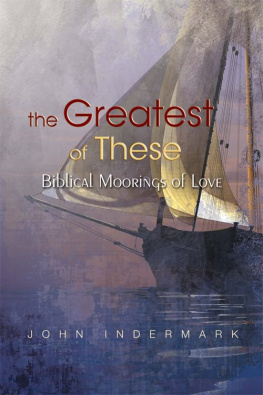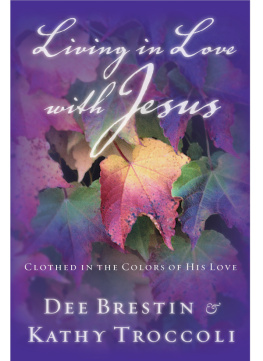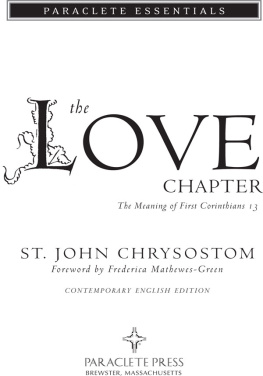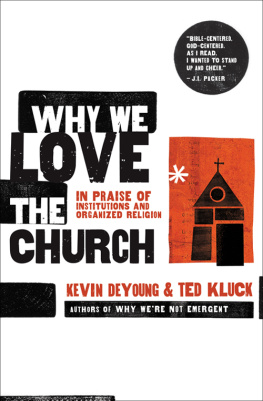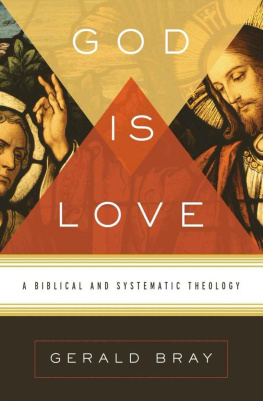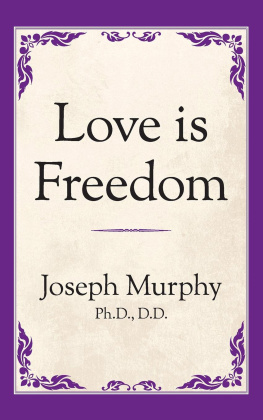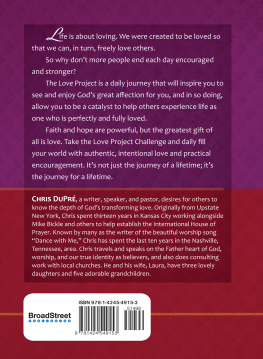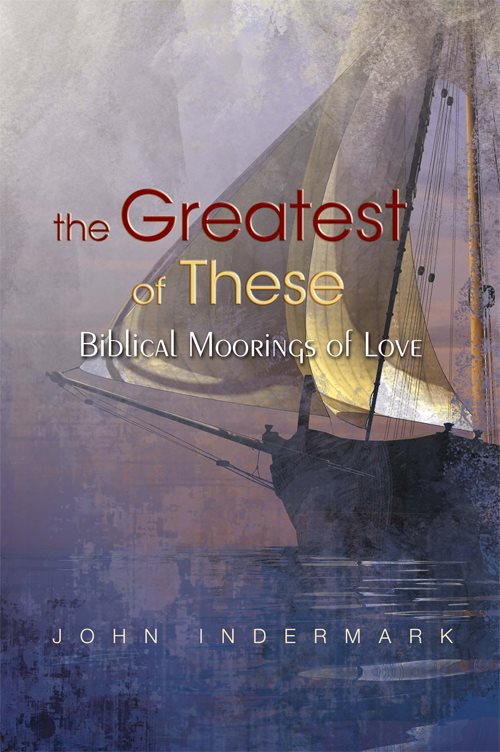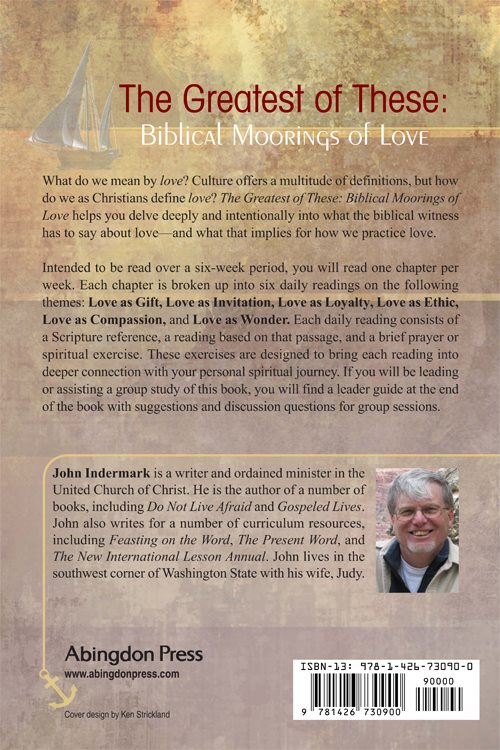Biblical Moorings of Love
JOHN
INDER MARK
Abingdon Press
Nashville
THE GREATEST OF THESE
BIBLICAL MOORINGS OF LOVE
Copyright 2011 by Abingdon Press
All rights reserved.
No part of this work may be reproduced or transmitted in any form or by any means, electronic or mechanical, including photocopying and recording, or by any information storage or retrieval system, except as may be expressly permitted by the 1976 Copyright Act or in writing from the publisher. Requests for permission can be addressed to Permissions, The United Methodist Publishing House, P.O. Box 801, 201 Eighth Avenue South, Nashville, TN 37202-0801, or e-mailed to .
This book is printed on acid-free paper.
Library of Congress Cataloging-in-Publication Data
Indermark, John, 1950
The greatest of these : biblical moorings of love / John Indermark.
p. cm.
ISBN 978-1-4267-3090-0 (trade pbk. : alk. paper)
1. LoveBiblical teaching. I. Title.
BS680.L64I53 2011
241'.4dc22
2011011690
All Scripture quotations are taken from the New Revised Standard Version of the Bible, copyright 1989, Division of Christian Education of the National Council of the Churches of Christ in the United States of America. Used by permission. All rights reserved.
Permission is granted to reproduce the Session Template for local congregation use only. For any other use written permission must be obtained by contacting the Permissions Office of Abingdon Press at 201 Eighth Ave. South, Nashville, TN 37202-0801. You may also fax 615/749-6128 or e-mail .
11 12 13 14 15 16 17 18 19 2010 9 8 7 6 5 4 3 2 1
MANUFACTURED IN THE UNITED STATES OF AMERICA
To
Judy and Jeff
For love's gift
and family's joy
CONTENTS
ACKNOWLEDGMENTS
The origin of the title for The Greatest of These was singular, borrowing Paul's memorable phrase that closes 1 Corinthians 13 and its elevation of love above all God's gifts. But the origin of the material contained between these covers, not to mention how these stories came to take on printed form, is multiple. And multiple acknowledgments of thanks are in order.
I owe thanks for the mooring of faith in love to the teachers who nurtured that connection in the Sunday school of Salvator Evangelical and Reformed Church in St. Louis. Two women in particular stand out in my memory: Mrs. Ada Prell, superintendent of the Kindergarten Department and wife of the pastor who confirmed me; and Mrs. Lillian Schaefer, superintendent of the Primary Department and the first person who suggested I should be a minister. As one of the readings will unpack more fully, their ingraining us in song and word that "God is love" made an indelible impression on me and countless others. As I grew, I also came to see that what these two women taught was what they lived. My parents and grandparents provided me with unconditional love, and that experience has strongly shaped the perspectives on love you will find in these pages. I am also deeply grateful to the editors and designers at The United Methodist Publishing House, for their contributions to the book.
Finally, I gladly acknowledge my thanks to my wife and partner, Judy, and our son, Jeff. In the end, love requires embodiment. The presence and love of these two have shaped me in ways that exceed my words, and have made it possible for me to practice a ministry of writing all these years.
INTRODUCTION
Why This Book?
The time in the worship service comes for the pastor's "children's sermon." During this time, the pastor often asks a question. I have noticed that children most frequently offer two answers, whether or not they directly relate to the pastor's question: "Jesus" or "love." These answers may partly stem from a tendency of children's sermons to boil down to one of those two themes. The answers also emerge from those two themes, which provide the core identity and vocation for Christian community. You cannot have Christian community without taking Jesus into account. And you cannot have Christian community without taking love into account.
The Greatest of These: Biblical Moorings of Love explores the meaning and practice of love in Christian faith. As children's sermons reveal, the theme of love serves as a catch-all of Christian faith. Love offers a watchword and a byword among usbut what do we mean by love? What exactly is it we are suggesting when we invoke cherished affirmations like "God is love" or "love one another"? This book will invite readers and study groups to delve deeply and intentionally into what the biblical witness has to say about loveand what that implies for how we practice love.
Notice I said "biblical witness" and not simply "New Testament." Sometimes the church proceeds as if "love" shows up only when Jesus comes along. That outlook is perilous in both its one-sided depiction of Judaism and its negligence of how Christian teaching on love grows out of our Jewish roots. Each chapter in this book will explore a particular theme of love through six biblical passages: one each from Torah, Prophets, and Writings (Old Testament); and one each from Gospels, Pauline Epistles, and General Epistles (New Testament).
A Lexicon on Love
The languages of the Bible, Old Testament Hebrew and New Testament Greek, provide intriguing insights into what is and is not meant by love in the biblical works.
Four Greek words in use during New Testament times for various kinds of love are: eros, philos, storge, and agape. Eros, like its English derivative erotic, has chiefly to do with intense desire. While it can refer to the desire for that which is true and good, it has been associated most frequently with sensuality and sexuality. Eros does not appear in any New Testament text. Philos is love primarily associated with friendship. It occurs a number of times in the New Testament, primarily in contexts where the love spoken of is between individuals or in community. Storge refers to familial love and occurs in combination with philos in Romans 12:10. In Romans 12, Paul uses variations of agape, philos, and storge in the instructions for relating to one another as members of the body of Christ. Agape, as used by Christians, refers to the self-giving love that is given by God. In the New Testament, variations of this word are used in reference to God's love for humankind, individually or collectively. Agape suggests the unconditional love that finds illustration in Jesus' command to his disciples: "Love one another... as I have loved you" (John 13:34, italics added). For the community of Jesus Christ, agape comes to us not by our earning or demanding it, but by the sheer grace of God's selfgiving love. Jesus calls his followers to this same, self-giving love offered to us by God.
Ahav, racham, and hesed are Hebrew word roots translated as various kinds of love in the Old Testament. Ahav carries a variety of meanings, including "to breathe after," or long for, something, "to love," and "to delight in."

